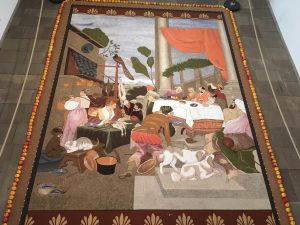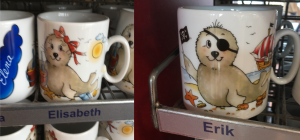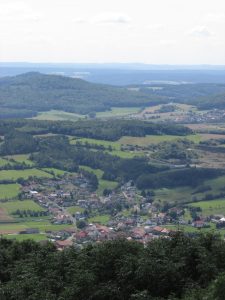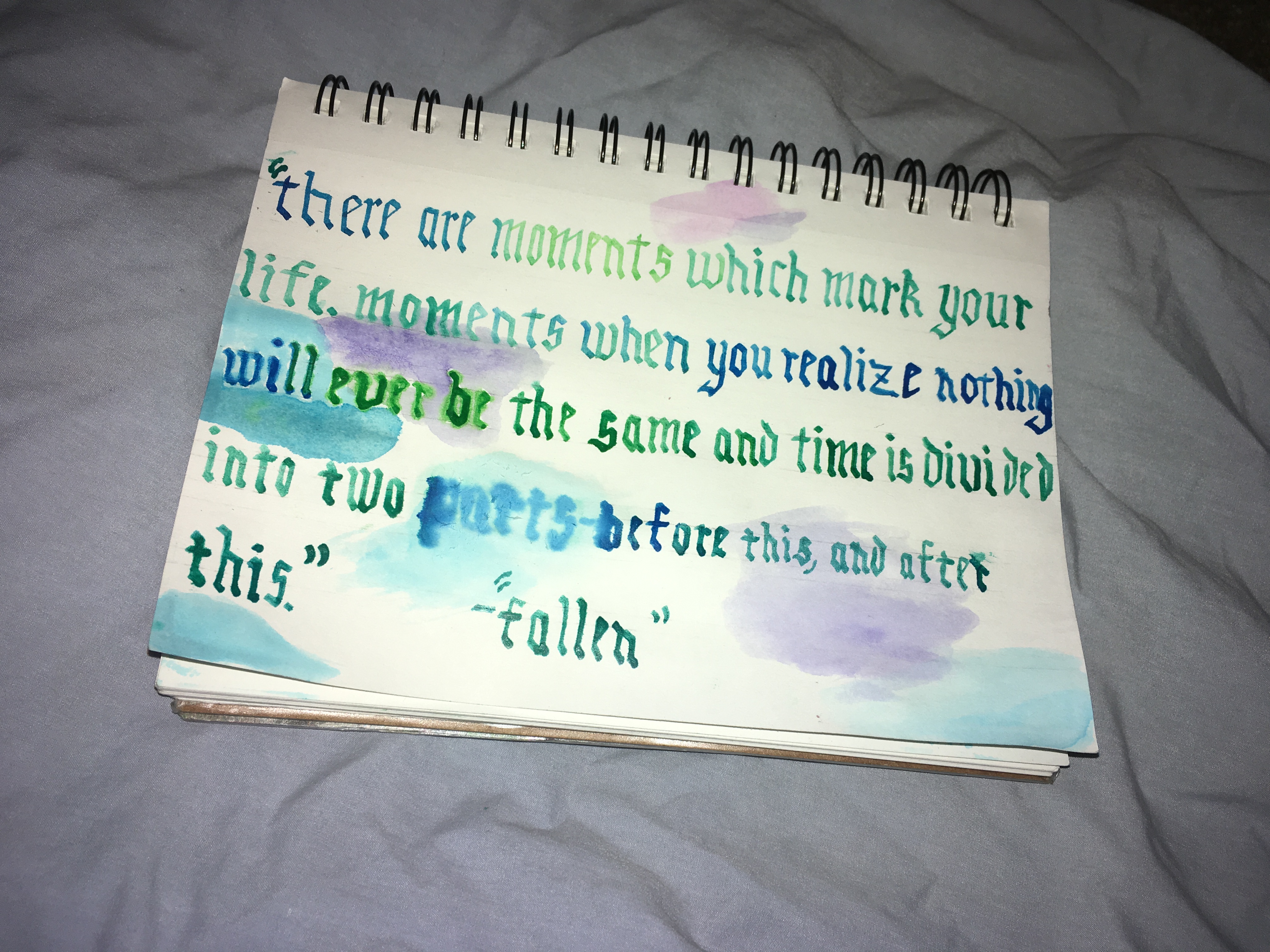The program in question:
https://www.uni-marburg.de/en/studying/studying-at-umr/exchange/iusp
There were a few things I underestimated when I began my study abroad experience and many more things I had no prior knowledge about. Here are a few things that may help someone considering this program:
- Deciding to go to Marburg through IUSP or ISEP
-ISEP asks for $9,050 for their program, housing not included. With housing, which is very limited in Marburg and hard to come by, the price becomes $10,400. This is a far cry from IUSP’s €5,500 (approximately $6,160) registration fee.
What can IUSP give you for two-thirds the cost? Quite a bit. Their website breaks the numbers down:
€ 2,150 for tuition, including:
- Language course (120 hours) <-Great course, I highly recommend
- German History and Culture course (56 hours) <- When I was there it was fairly worthless because our teacher didn’t want to be there, so I expect it will be better for future participants if they get a new teacher or she seriously improves. The field trips, however, were excellent. Amongst them were trips to Marburg’s dunkle café- a café where guests are served in complete blackness by blind servers, Blista- a school for the blind and visually impaired, a tour of Marburg’s Mosque, a tour of Marburg’s new Synagogue, a tour of wind turbines outside the city proper, a trip to Berlin (a tour of Stazi prison- a place for East Germany’s prisoners of war and undesirables, the Reichstag- Germany’s parliament, the Brandenburg Gate- a war monument built by Fredrich the Great, and a walking tour), a trip to Weimar (city tour and tour of Buchenwald, a Nazi concentration camp uphill and fully visible to the town below. They didn’t give us much free time on this trip so if you’d like to see the museums I suggest skipping the Weimar city tour), and a trip to Koeln.
- 2 seminars (48 hours each) of your choice <- Great selection in the link here, although the courses change from Semester to Semester ( https://www.uni-marburg.de/en/studying/studying-at-umr/exchange/iusp/academic-program/semester-classes )
- Conversation class (36 hours) <- meeting once a week during the regular semester and talking and playing games. We went to places I wouldn’t have otherwise seen (example A: a local bar) and had a great Christmas party for our last meeting.
€ 3,350 for room, board, etc., including:
- Course material for the intensive German class
- Cultural program (Weekend trips: Hostel, breakfast and guided city tours are included in the program fee.)
- Meal subsidy (comes in the shape of a cafeteria debit card, charged with € 50 per month) Please note that they do not have a meal plan!
- Semester administration fee including ticket for free public transport anywhere in the state of Hesse
- Local bus pass for the time before the validity of the semester ticket
- Accommodation (single room in one of our student dormitories, plus cleaning fee. If you do not need accommodation through IUSP, they deduct € 800 from the program fee.)
What does ISEP offer for an extra $ 3,000? It goes through IUSP so it gives you IUSP’s program benefits plus it handles paperwork you would otherwise have to do yourself, such as arranging plane tickets and renewing passports. In my opinion ISEP is not worth it.
- Length of your stay: an American quarter, a European quarter, or a full year of study?
-I was there for the shortest possible length, the American quarter, and it was fine. I learned a lot and my speaking skills improved dramatically even though I was only there for 4 ½ months. However long you think you want to and have the means to stay is what you should pick.
- Will the credits transfer?
-Yes, they should, and they should translate to around a regular course load credits-wise for Western. If you want credits to count to your major, talk with you major and minor councilors in their departments to review the Marburg course list and see which classes fit Western’s requirements. Remember that for some degrees, you’ll need a certain number of elective credits within the degree, so even if a class doesn’t sound exactly like a class offered at Western, you may still be able to count it towards your degree. But if a course calls to you and it’s not within your degree, please consider it too.
- Does the Mensa serve vegetarian and vegan options? Also, the IUSP tuition fee included a meal subsidy in the shape of a cafeteria debit card. If I don’t use all the money on it, can I get refunded?
-Yes and Yes. IUSP staff will e-mail you instructions about how to get the extra money off your card at the end of your stay. The cafeteria has vegetarian and vegan food available, although I suspect some of their vegetable soup has chicken stock. Marburg proper has lots of vegan food too (especially Turkish food. The city even has its own specialty grocery store), so someone with these diets won’t go hungry. For those who are gluten intolerant or have other dietary restrictions, please contact the IUSP staff for further information:
https://www.uni-marburg.de/en/studying/studying-at-umr/exchange/iusp/contact-1
- What are the dorms like?
– Most Germans believe that rooming with a stranger (aka, a roommate) is crazy. Consequently the dorms seem to have high standards. I was in Fuchspass, and my room was not only bigger than Western’s dorms, but it came with shelving, free bedding and a service that would wash the bedding and give you clean bedding every week, a walk-in closet, two big windows, a trashcan, a cozy chair, a desk, and a sink. It comes with its own heating system and on each floor there are bathrooms, showers, and a kitchen with lockers for your cooking gear.
- Would I bring/ buy dishes and cooking supplies or is it included?
-You will need to buy your own cooking gear if you intend to cook. The student dorms each have a kitchen per floor with an oven and electric burners. No microwave, but it does have a compost and trash bin. The kitchens are cleaned by staff throughout the week. IUSP will have an item swap at the beginning of the program, which is made up of items left by previous IUSPers. Cooking gear may be available (for free).
- Do they have washing machines? Are they labeled in English?
-There are washing machines and a dryer for each building. They are in German but there are translations on posters on the walls. Washing your clothes at 30*C should clean them without shrinking them. The dryers, however, are expensive to run, will not completely dry your clothes unless you turn the heat all the way up and have very small loads. If possible, you should buy some hangers in Marburg and hang clothes dry outside of your closet. The rooms will get humid so you’ll need to balance between turning your thermostat up and opening the windows. It may be difficult in the beginning, but it gets much easier over time.
8.Where can I see a doctor if I get sick?
-(Firstly, my experience applies to people who have health insurance coverage overseas. This is something that you may be able to add onto your normal health insurance plan for the length of your stay.) If you feel ill and need to see a doctor to get a prescription for medicine, you should visit the hospital conveniently accessible via bus. The main entryway of the hospital has three different sets of doctors you could visit: the ER (downstairs, accessible through the left-hand elevators down the main entryway); a set of nose, ear, and throat doctors (available on the right side of the main entryway past the Apoteka); and a set of doctors which rotate (on the right side of the corridor, past the nose, ear, and throat doctors). If you ask the hospital staff for help at one of their many info desks, they should be able to point you in the right direction. The ER is the only one of the three that is open at all times, but only takes emergencies; hours are posted in front of each practice. The quality of the rotating doctors is a dependent on who is working that day: the first doctor I saw was great and gave me a prescription for the antibiotics I needed. The second doctor I saw to make sure I was 100% better from the previous illness thought my acne was herpes. The doctors and medical staff know some English, but it’s much easier to communicate with them if you know German or have a friend who can translate for you. Any prescriptions can be filled at an Apoteka, or apothecary. Apothecaries and bakeries are on almost every other street, so don’t worry about not being able to find one. Any apothecary will do.
9.How much German would I need to know to get the most out of the program?
-While you don’t need to have any experience with German before you go, I am of the opinion that having a general understanding of the language before going will help have a better chance of reaching near fluency while you’re in Marburg. It all comes down to why you’re considering studying in a German-speaking country. For me, I had taken German in high school and at university, and my problem with German is that I hadn’t heard it enough, so studying abroad was my last resort for improving my language skills enough so I could potentially use it in a professional setting. I simply didn’t know enough before the trip, and the lessons that I did learn became jumbled in my head and I’d make many mistakes. Being in Germany however, helped me understand when to use which of the grammatical pieces I’d learned before, because German was all around me. The language classes IUSP has were also very good and helped polish my rough edges. If you’d like to go so you can become fluent, I’d suggest going as a junior; however, it also depends on your personal situation and language acquisition skills, so please don’t be discouraged from going whenever you think is right.
- How safe is Marburg?
-Despite copious quantities of graffiti, Marburg is very safe. Since my last class ended after the bus lines stopped running every 10-15 min, I opted to walk home instead. I would walk from the Elizabeth Kirche to the student dorms, a distance of about 1.5 miles. I never encountered any trouble walking back home even though it was late at night (around 10:00pm) and not all of the pathways I took were well lit. This being said, please use common sense and travel with a friend.
-On a different note, one of my friends in the program was profiled on multiple occasions inside and outside of Marburg. The son of native Mexicans, my friend has black hair and a lighter complexion than the rest of his family—appearances that many took to mean he was Middle Eastern. These assumptions were not usually a problem, but it was enough to get him eyed by a policeman at a Christkindlesmarkt. That was a little scary because all the policemen in Germany are armed to the teeth. I think traveling with other people made it safer for him to go to crowded events, because his travel mates could have vouched for him had he ever been confronted and being with lighter skinned people made authority figures see him as less of a potential threat.
- Are there refugees in Marburg?
-There were no refugee camps as of my time abroad in the winter of 2017, but there are refugees in the city. Most of the possible refugees I saw were beggars, and people who actively try to get you to give them money. One woman asked me to ‘donate money for my brother’s operation’ after ‘giving’ me a rose, only to later appear in the Mensa and ask people for ‘money for the baby’ whom she carried on her back. People offer roses in many cities in Germany, but if you take it you have to pay for it. Some of these people may be in real need, but most of them are beggars who station themselves by places where money will be (ie: the bank, the mall). The cost of living is relatively low in Germany, so it’s entirely possible for these people to live off of donations perpetually. If you want to help these people, then please consider giving to programs that help refugees establish themselves in Germany, rather than giving donations to individuals. Marburg has a program to help refugees study in its university and some of the IUSP teachers are directly involved in teaching refugees German. The IUSP office should know more if you would like to look into this. 12. Are there any public holidays I should be aware of?
-Since Germany is not a secular country, many Catholic holidays are celebrated, and when they are, everything closes. The grocery stores and banks also aren’t open on Sundays, so plan accordingly. There are some exceptions to this Sunday rule, as the hospital and a handful of museums stay open, so check their hours in advance.
13. Should I buy a Deutsche Bahn monthly/yearly pass so I can use the trains?
-Not necessarily. Part of your IUSP registration fee goes to buying you a semester ticket which lets you travel the entire state of Hesse for free using buses and trains. This means traveling to and throughout Marburg, Frankfurt, and Heidelberg are absolutely free. If you want to travel a long distance, I heard there are many affordable bus shuttles that can also take you to ‘far off’ places like France and Italy. During the program there isn’t much time for sight-seeing because you’re working on school stuff, so if you want to travel you should set aside time before or after the program.
15. Where can I ask the IUSP folks other questions?
Here is their contact page:
https://www.uni-marburg.de/en/studying/studying-at-umr/exchange/iusp/contact-1




